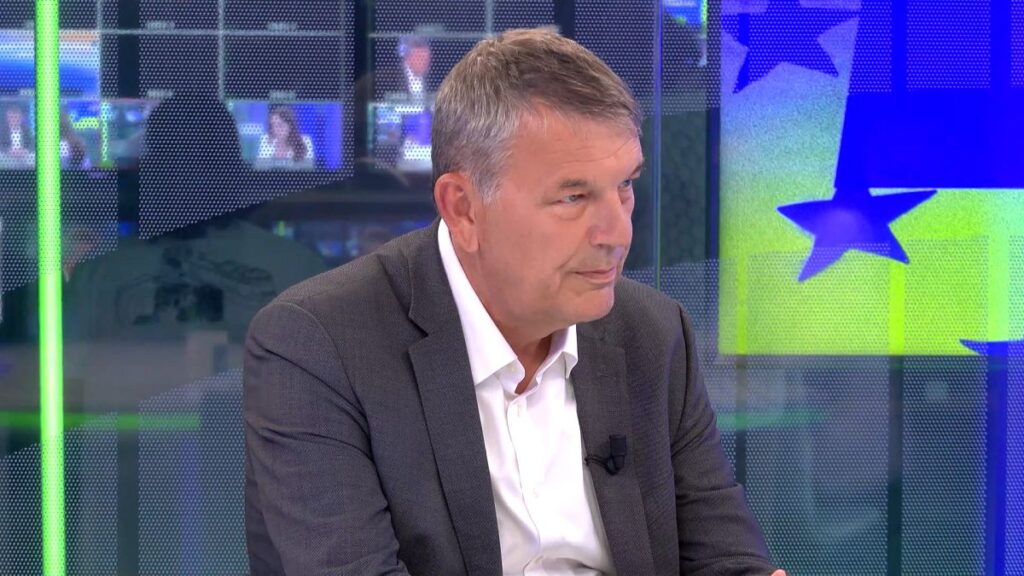The commissioner-general of the UN agency for Palestinian refugees (UNRWA), Philippe Lazzarini, has said he fears Gaza may soon no longer be a “land for Palestinians to live in” amid intensified Israeli airstrikes and ground operations.
Asked in an interview with Euronews earlier this week about Israeli plans to control the Gaza Strip in its entirety, Lazzarini said: “We have seen many (Israeli) plans, some of them more dystopian than the other.”
One of those plans, seen exclusively by Euronews last week, suggested the IDF could temporarily introduce martial law and force civilians into designated security zones.
“There is absolutely no safe place,” Lazzarrini told Euronews. “What I see for the time being is a continuation of the destruction, deaths and killing of the Palestinians in Gaza. And my fear is that we might reach a point where Gaza might not be a land anymore for Palestinians to live in.”
On Monday, Israeli Prime Minister Benjamin Netanyahu authorised the entry of “basic amounts” of food into Gaza after an eleven-week blockade on all humanitarian supplies.
Israel says aid was cut off because it was being looted and “monetised” by Hamas – which led the 7 October attacks on Israel that triggered the Israel-Hamas war in Gaza – and other militant groups.
But Israel’s decision to allow the entry of restricted amounts of food has been described as a “smokescreen” by aid groups. The European Union and the UK have since announced they would revisit their trading relationship with Israel in response.
“It’s a total outrage that we are confronted with a situation of starvation when it comes to Gaza. It’s a completely fabricated one, a man-made one,” Lazzarini said. “Basically, we are in a situation where hunger and food is being weaponized for political and military purposes.”
Israel says a new aid operation it has initiated with the backing of the US will be up and running by the end of May. It would see a Swiss-registered, US-backed charity called the Gaza Humanitarian Foundation (GHF) set up aid hubs with the assistance of private firms.
Lazzarini rejected the scheme, saying it fails to meet “any basic humanitarian principle, including humanity and impartiality.”
GHF has said civilians in Gaza would be required to collect aid packages weighing as much as 20kg from limited distribution points.
Lazzarini said the operation would cut off the “most vulnerable” from aid and “trigger forced displacement” while a military operation takes place.
UNRWA chief has to ‘contemplate’ closing agency
UNRWA has, until now, been the main provider of humanitarian aid to Palestinians in Gaza. But its activities in the occupied Palestinian territories were banned in January under two pieces of Israeli law.
Israel has consistently accused the agency of being “infiltrated” by Hamas, which has been designated a terrorist organisation by the US, Canada, Australia, the UK and European Union, among others.
Nineteen UNRWA staff members were suspended last year amid suspicions they could have been involved in the 7 October attacks on Israel. The Israeli government also says it has evidence UNRWA facilities in Gaza were being used by Hamas operatives to shelter and store weapons.
Lazzarini said the investigations into the 19 staff members were “not conclusive” but that the agency suspended them regardless.
“Whenever there is an allegation that staff might be part of the armed group of Hamas, we will act quickly. But for that we need collaboration, we need information,” Lazzarini said.
“And over the last two years, I have repeatedly asked the government of Israel to share information with the UN or with UNRWA. Until today, we have never received any substantiated information.”
UNRWA’s finances have also suffered after the withdrawal of major donors, such as the US, which previously donated as much as $422 million (€372 million) annually to the agency.
“I really hope I will not be pushed into a situation where I have to announce the suspension of all our services,” Lazzarini said. “This is something I unfortunately have to contemplate on a regular basis.”
Aid cuts could be costly, Lazzarini says
Lazzarini called on Western governments to “not compromise our ability to respond to crises” with sweeping cuts to humanitarian aid budgets.
Several Western governments including the US, UK, Switzerland, Germany and France have slashed their aid budgets considerably in recent months.
“I know that many countries are going through austerity, but cutting in international cooperation or humanitarian assistance is certainly not the area where countries should cut,” Lazzarini explained.
“If we do not address a crisis, people will want to leave and most likely come here, and then the cost will be much more expensive,” he explained, suggesting the cuts could trigger forced migration from crisis areas.
Watch the full interview on the Europe Conversation in the video above.
Read the full article here

